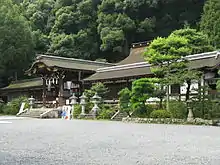Matsunoo-taisha
Matsuno'o Taisha (松尾大社, Matsuno'o Taisha/ Matsu'o Taisha), formerly Matsuno'o Jinja (松尾神社), is a Shinto shrine located at the far western end of Shijō Street, approximately 1.3 kilometers south of the Arashiyama district of Kyoto. It is home to a spring at the base of the mountain, Arashiyama, that is believed to be blessed.
| Matsunoo-taisha 松尾大社 | |
|---|---|
 The haiden, at Matsunoo-taisha | |
| Religion | |
| Affiliation | Shinto |
| Deity | Ō-yamagui-no-kami Nakatsu-shima-hime-no-Mikoto Tsukuyomi |
| Location | |
| Location | 3 Arashiyamamiya-chō, Nishikyō-ku, Kyoto, Kyoto Prefecture 〒 616-0024 |
 Shown within Japan | |
| Geographic coordinates | 35°00′01″N 135°41′07″E |
| Architecture | |
| Date established | 701 |
| Website | |
| www | |
It is said that during the move of the capital from Nara to Kyoto, a noble saw a turtle bathing under the spring's waterfall and created a shrine there. It is one of the oldest shrines in the Kyoto area, its founding extending back to 700 CE. The restorative properties of the spring bring many local sake and miso companies to the shrine for prayers that their product will be blessed.
The shrine also serves a kinpaku miki (gold leaf filled blessed sake) during hatsumōde.
History
The shrine became the object of Imperial patronage during the early Heian period.[1] In 965, Emperor Murakami ordered that Imperial messengers were sent to report important events to the guardian kami of Japan. These heihaku were initially presented to 16 shrines including the Matsunoo Shrine.[2]
From 1871 through 1946, Matsunoo-taisha was officially designated one of the Kanpei-taisha (官幣大社), meaning that it stood in the first rank of government supported shrines.[3]
Images
 Front gate
Front gate Horai Garden of Shofuen
Horai Garden of Shofuen Kyokusui Garden of Shofuen
Kyokusui Garden of Shofuen Shrine to Tsukuyomi
Shrine to Tsukuyomi
Notes
- Breen, John et al. (2000). Shinto in History: Ways of the Kami, pp. 74-75.
- Ponsonby-Fane, Richard. (1962). Studies in Shinto and Shrines, pp. 116-117.
- Ponsonby-Fane, Richard. (1959). The Imperial House of Japan, pp. 124.
References
- Breen, John and Mark Teeuwen. (2000). Shinto in History: Ways of the Kami. Honolulu: University of Hawaii Press. ISBN 978-0-8248-2363-4
- Ponsonby-Fane, Richard. (1962). Studies in Shinto and Shrines. Kyoto: Ponsonby Memorial Society. OCLC 399449
- ____________. (1959). The Imperial House of Japan. Kyoto: Ponsonby Memorial Society. OCLC 194887